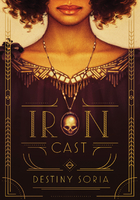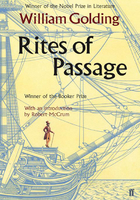Ahead of him Spencer's Mountain loomed snow-white, pine-green, arched with the misty blue of a cold, snowy December afternoon. The mountain housed all those things mysterious to Clay-Boy. There were caves there where, long ago, boys had been lost and never found. One of the caves contained a hidden lake, so deep that if a stone were dropped from the rim a person could count to five before the sound of the splash would travel back. The mountain was home to monstrous rattlesnakes, owls, bobcats, bears, all manner of rodents, but its special fascination for Clay-Boy lay in the fact that it was the range of a legendary white deer imbedded in his memory from the earliest tales he had heard from his Grandfather Spencer.
"Up on the mountain, when I was a boy, there used to be a big old buck deer that was white all over and had pink eyes. Lots of folks that never laid eyes on him used to claim there wasn't no such thing. Some of them even claimed he was a ghost. I don't say one way or another, ghost or flesh. All I know is I have laid eyes on him."
The story would be told at family gatherings when the men would congregate in the living room to drink whiskey and swap yarns.
"Oh, Papa, that deer is dead and gone. I never heard of one liven longer than ten or eleven years."
"He's up there. You mark my words!"
Clay-Boy had never seen the albino deer, but his grandfather's stories were seared in his memory. Now as he entered the old wood road which wound its way to the top of the mountain, he was conscious that he was in the deer's territory and almost automatically began keeping an eye out for tracks or droppings that might alert him to the deer's presence. If indeed the deer existed at all.
The wilderness silence and the snow silence descended upon the boy as he trudged upward through a landscape of leafless trees, their dark sleeping limbs starkly etched against the virgin snow. As the woods filled up with snow, each dazzling crystal stuck wherever it fell and the road turned into a fantastic aisle of white carpet through crystal columns and ermine arches. The crystals were small, the kind his grandfather always predicted foretold a deep and powdery snow, and his grandfather spoke with authority, for he knew how to read the messages hidden in moon and cloud and wind.
The boy was warm in his father's old sheepskin jacket. The jacket smelled of his father, a faint scent of tobacco smoke, the remembrance of gun-powder, for Clay always wore the jacket when he went hunting for quail or rabbit or wild turkey which the family had come to depend upon increasingly for food since the Depression had arrived.
Clay-Boy pushed his hands into the pockets of the jacket and found in one of them the remains of a pack of Camels and a box of matches. He had experimented with smoking before and found it to his liking. Removing a crumpled cigarette from the pack, he lit it and drew the smoke into his lungs. When he exhaled, the blue smoke drifted off through the sharp wintery air and dissolved in the snow. Clay-Boy couldn't decide what it was he liked about smoking. He wondered how he looked holding the cigarette between his thumb and fore-finger, the way his father did. He fancied he probably looked like a man.
Clay-Boy thought of his father ruefully. Clay Spencer was a hard man to measure up to. Like all the Spencer men he was a crack shot, a good provider for his family, an honest "look-'em-in-the-eye" man, an enthusiastic drinker, a prodigious dancer, a fixer of things, a builder, a singer of note, a teller of bawdy stories, a kissing, hugging, loving man whose laughter would shake the house, and who was not ashamed to cry. He seemed to his son an outsized man, bigger than life. It was with a sense of wonder that the boy observed his own body's growth and found his head reaching, it seemed to him almost overnight, to a level with his father's head, shoulder to shoulder, eye to eye.
As much as he wanted to be like his father, something pulled Clay-Boy in another direction. He knew his father sometimes thought him strange. Clay would walk into the boys' room and observe his son intently writing with a pencil in his school tablet. The other children would be in the yard playing Giant Step, or Capture the Flag, or baseball. Clay would look at the boy, vaguely troubled.
"What you up to, son?"
"Homework," Clay would lie, and cover the tablet. How could he possibly tell his father that he was writing a story? Writers had names like Alfred Lord Tennyson, Percy Bysshe Shelley, and William Makepeace Thackeray. How could his father possibly understand that he, Clay-Boy Spencer, felt some strange compulsion to write his thoughts into a tablet meant for school work? He had told no one, and hid the things he wrote away from the world like some secret vice.
He was overcome for a moment with a sense of futility. There was so much he wanted to tell, so much he felt that he could only tell in the words he wrote on the tablet. But he was reaching now toward manhood. The time would soon be near when he must put away childish things and learn to be a man, to make a living and provide for a family.
He watched the wood softly receive the white snow blanket, gently transforming rock and bush and clay bank into new and magical formations. He crossed a small ice-crusted stream where beneath the opaque, frost-fingered ice the water gurgled slowly. Skirting the stream, he continued the upward climb.
Halfway up the mountain Clay-Boy paused to rest. He looked up, gauging how much farther he had to climb. From where he stood, he could see dimly outlined through the snow, the promontory which was the site of his father's house. The house was not really a house, but a dream his father had. It was Clay's dream to build a house with his own hands, a house his wife and children could see being constructed, a house that would give strength and love to their lives because they would see the strength and love with which it was built.
"I can see it now, a white house with green shutters on the windows. Your mama sitten up there on the front porch resten of a Sunday. Your mama will plant flowers down the walk on either side and I'll put in a bed of grass where my babies can play."
Clay had promised the house to Olivia on their wedding night and had shown her where he would build it, on the summit of Spencer's Mountain in the same spot where his mother and father's old cabin had long since rotted away.
In olden times Spencer's Mountain had belonged to Grandfather Spencer. As each of his sons became twenty-one the old man would give him his choice of land so that by the time Clay, the youngest, reached the age of manhood, the mountain had been divided into nine plots, and Clay fell heir to the original cabin. Only Clay, of all the brothers, held on to his share of the mountain.
As the years went by, the vision of the house he would some day build never left Clay Spencer's mind. Every time he passed the site he would imagine the house. In his dreams it was always etched against a summer sky, the house a solid frame structure with many rooms, painted white, the windows trimmed with green shutters, and a wisp of smoke trailing from the chimney. The vision was so real to him that he could almost hear the children's voices inside or see Olivia's face at the window.
Yet, as strong as this vision was, he had never gotten beyond excavating the basement; this he accomplished every summer, only to have it fill in again during the fall and winter rains. Each summer he would attack the hole again with the intention that this year he would at least get the foundation laid during the weekends when he did not have to work at the mill. When the Depression came and Clay went off to Waynesboro to work, progress on the house stopped entirely.
Snow had covered the site of his father's dream house when Clay-Boy arrived there. He had saved himself the trouble of toting an ax, knowing his father kept one with the other tools he stored on the mountain to build the house with. Clay-Boy found the snow-shrouded mound where the tools were stored. With mittened hands he pushed aside the frozen tarpaulin and took out the ax. Holding the ax carefully, the way his father had taught him to carry it on slippery ground, Clay-Boy set out across an open field which in his grandfather's time had been planted in corn. Next he passed through what had been an orchard. A few of the old peach and apple trees still remained, but they were old and neglected and bore little fruit. His grandfather had cleared the land to the edge of a pine forest. Reaching the edge of the stand of pine, Clay-Boy skirted the forest for nearly half a mile and continued on to another large open field which had formerly been used to pasture cattle.
The place was a high meadow. In the summer it was filled with the scent of sun-hot clover, but now it was a long and lonely expanse of snowy field. The meadow was dotted with many trees, but Clay-Boy went directly to one of them. The tree was six feet tall, a perfectly symmetrical eastern hemlock. Even in the brisk winter air, Clay-Boy could smell its pungent evergreen scent. He and Mama and the children had come upon it last summer on a berry-picking expedition. They had agreed, even that long ago, that this particular hemlock was to be this year's Christmas Tree. Whenever some chance brought them to the mountain, they had visited it and envisioned it standing in the corner of the living room, festooned with ropes of silver tinsel and hung with ornaments of red and green and gold, crowned at its very tip with the silver star which had been in Grandma Spencer's family for generations.
Getting down on his hands and knees, Clay-Boy crawled under the tree to examine the trunk. He discovered there a secret world. The upper branches of the tree had caught the snow so that none had fallen on the earth below. A thick circle of needles covered the ground and the lower limbs dropped at their tips to form a small, tent-like enclosure. No wind reached him there and Clay-Boy felt the way he imagined it might be in an igloo. There were rabbit droppings in spots and a small pile of pine wood knots. Clay-Boy guessed that his father might have thrown the pine knots there to hide them, for they caught flame readily and made good starting wood for a fire. Clay-Boy was still for a moment, imagining the feeling of sanctuary a small animal might enjoy if it sought refuge there or stopped for a moment to rest.
Clay-Boy was examining the base of the tree to determine just where to make his first cut with the ax when in the periphery of his vision he detected movement.
He felt an involuntary sense of fright because he had thought himself to be alone.
He turned and drew in his breath excitedly at what he saw. At the edge of the pine forest was a female deer. She stood, Clay-Boy guessed, about shoulder high. Her coat for the winter had turned a bluish-brown, except for the inside of her ears and the throat patch, which were pure white. She was fully grown and looked to weigh from a hundred and fifty to two hundred pounds. She raised her head, her black, moist nose pointing to the sky, and since he was downwind from her, Clay-Boy knew that she had no idea of his presence.
Satisfied that the field was free of danger, the doe started across it in rhythmic leaps. From time to time she would stop and gaze about searchingly. Clay-Boy wondered what had brought her there. Usually the deer gathered in herds and spent the winter months together for protection. Perhaps she was late in season and might still be seeking a male deer. Or it could be that she had been separated from the herd by a dog or hunters or a wildcat, and she was trying to locate the herd again before the dark winter night set in.
Spellbound by the sight of the deer, Clay-Boy lost all sense of time. The doe continued toward him, in a graceful, undulating motion, setting her thin hooves down in the snow in a sure and elegant unison. Clay-Boy was glad he had not brought a gun. The family could have used the venison, and he might have been tempted to shoot her.
He decided that she was simply out for her evening feed, for about a hundred feet from where Clay-Boy hunched in his hideaway, the doe stopped and began to graze on the tips of a persimmon grove. Some frost-blackened persimmons still clung to the tree. She ate these first, swallowing seeds and all. Then she began chewing off the softer and younger twigs and branches. Clay-Boy drew in his breath and caught the faint scent of wild, musky game.
Perhaps she heard him breathe. Perhaps the wind turned. In an instant the doe perceived Clay-Boy's presence. In a single motion she flagged her tail, lifted her head and sprang into the air. When she touched the earth again her legs carried her swiftly forward.
As swiftly as she bolted away, the deer came to a halt and seemed to sink into the snow. Watching her struggle, Clay-Boy wondered what had brought her down, and then he saw that she had become trapped in a deadfall. He and his father had thrown the collection of dead limbs and branches into the deep gully last summer when they had cut down an old water oak for firewood. They had filled the gully with the limbs, hoping to stop the erosion which was setting in, and with the snow covering the deadfall, the doe had mistaken the crust of snow for solid ground. Now she was trapped, her legs plunged through layer after layer of dead branches. She thrashed about wildly in an attempt to free herself, but she succeeded only in sinking deeper and deeper into the mesh of dead tree limbs. Trapped, earth-bound, subject to gravity, some magic quality went out of the animal. Clay-Boy regretted that her flight had been halted, and he debated whether he might be of any use to her or whether she might free herself unaided.
It would have been a simple matter to dispatch her with one blow of the ax, and the thought occurred to Clay-Boy because he was the son of a hunter. But that was not the boy's intention as he rushed toward the deer, ax in hand. He had thrown many of the branches there himself, knew the direction in which they lay and figured that by dragging some of the heavier limbs out of the pile he might free the doe.
At his approach she thrashed about with renewed vigor, throwing her head from side to side, watching him with haunted eyes. Closer now, he could see the slender grace of her brown face, the dark anguished eyes circled with white fur.
"Easy, girl," he called in a soothing voice, but the doe showed her distrust by renewing her struggle and fighting the deadfall.
Much of the snow which had been encrusted on the surface of the deadfall, shaken loose by the struggling deer, had sifted down so that Clay-Boy could tell exactly which limbs held her so securely. When he was within arm's reach of the doe she seemed to be suddenly paralyzed, or else so resigned to fate that she lay completely still, her eyes blinking with hatred. Clay-Boy reached out and grasped the end of a limb. When he began tugging at it, the doe lifted her head sharply, throwing foamy saliva on his jacket.
"It's all right, lady," he said softly, making himself move slowly, hoping not to frighten the doe further.
Slowly he extricated a limb from the pile, but it was not enough to free the doe. He threw it aside, returned to the deadfall and pulled another limb free. He loosened another and another. Suddenly the doe heaved her body upward, freeing one leg for a moment, only to sink again into the mass of limbs.
Through the swirling snow Clay-Boy felt the day shift. The unseen sun was moving down toward the horizon. Night would be falling soon. He did not want to be caught on the mountain after dark. It would take him hours to remove the entire deadfall, so Clay-Boy knelt in the snow to examine the way in which the doe was caught to see what limbs might be most strategically removed.
Peering into the maze of tree limbs, his attention was drawn to a sound. It was a high, nasal, angry snort. Clay-Boy jerked his head around but at first saw nothing which could have made the sound. Then something moved across the snow-swept field, a massive, albino buck, and even at this distance Clay-Boy could see its pink eyes grown red with anger.
From the number of its points Clay-Boy knew that the buck was young, not the legendary white deer of his grandfather's tales. It was sure, however, to be a son or a grandson. Because natural-colored deer will avoid an albino, and because the buck still retained his rack of antlers, Clay-Boy judged that the buck was still in rut and might have been enticed there by the scent of the doe. If that was the case, Clay-Boy knew that the normally placid and furtive animal could be dangerous.
One moment the albino buck was standing quite still, a second later he stamped the ground twice, and then charged.
Clay-Boy felt his mouth go dry. A rash of adrenaline sent his heart pounding and his feet flying. The nearest cover was the Christmas Tree he had intended to cut. Throwing aside the ax, Clay-Boy dashed for the tree. Reaching it, he slid underneath and hunched there panting.
The buck charged blindly, rack down. When he reached the spot where Clay-Boy had been standing he checked his run, jerked his antlered head aloft, breathed in deeply, and searched about for his enemy. Carried on the wind, Clay-Boy's scent betrayed him.
Again the buck lowered his antlers, and with a quick rush he attacked the tree. Clay-Boy could feel the impact at the base of the tree when wood and antlers clashed. For a moment the antlers were enmeshed in the hemlock branches, but with a powerful wrench the deer freed them. Clay-Boy could feel the enraged breath and smell its foul odor and hear the whistle of the wind as the buck slashed at the tree, first with its antlers and then with its slender, wicked hooves.
For a moment the buck withdrew, but only to brace himself for a second assault. The second attack was more powerful than the first. Clay-Boy felt the tree shudder, heard the impact of antler against wood. Then to Clay-Boy's astonishment the rack of antlers simply dropped only a few feet away from his eyes. Already past their normal time to drop, they had simply cracked away from the buck's skull. Shorn of his antlers, the buck backed away in confusion.
The buck's bewilderment was temporary. With renewed rage he attacked the tree with his front hooves, making short loping runs, rearing up and slashing down through the branches. If he continued he would eventually strip every branch from the tree and Clay-Boy would be exposed. There was no place for the boy to run, and it would do no good to call for help because he was alone on the mountain.
Crouched in his rapidly disappearing sanctuary, Clay-Boy searched about for a weapon. He found only the resinous pine knots. He lifted one. It would do for a club, but even as he hefted it Clay-Boy knew it was no match for the slashing hooves.
Once again the deer charged. Looking up, Clay-Boy could see the sweating nose, the strained visible breath, the wild bloodstained eyes. Albinos' eyes were said to be weak and sensitive. Clay-Boy counted on the truth of that folklore.
Plunging his hand into the pocket of his father's jacket, he grasped the box of kitchen matches. His hand trembled as he withdrew a match, and scratched it against the friction board until it lit. Holding the flame against the splintery underside of the pine knot he prayed that the knot would catch fire. One splinter caught flame, and then another and another. A drop of resin sputtered for a moment, then sizzled and added fuel to the fire. It took only one match. Sheltering the small flame with his jacket, Clay-Boy waited. The flame grew and in moments the knot was a glowing torch.
The buck was poised for a new assault on the tree. He bound forward, raised his hooves and brought them crashing down through the limbs. At the same moment, Clay-Boy rose and thrust the flaming torch toward the buck's face. The deer snorted at the insult, reared upward, and then bolted away from the tree, momentarily blinded by the light, crashing through thickets of persimmon and chinquapin.
At the edge of the wood, the buck stopped and turned, looked back with crazed eyes as Clay-Boy emerged from underneath the ragged tree, still holding his torch aloft.
The doe had nearly succeeded in freeing herself. Keeping one eye on the buck, who stood pawing the ground at the edge of the pine wood, Clay-Boy grasped one large tree limb in the deadfall, gave it one powerful tug, and the doe leaped free.
Limping slightly she bounded into the forest. The buck turned and followed.
"Merry Christmas, you hellion!" shouted Clay-Boy, his voice fading quickly in the insulating snow. Clay-Boy picked up his ax and looked back at what was to have been the Christmas Tree. The ground around it was churned and torn from the buck's onslaught. The tree itself had been ruined, but Clay-Boy was grateful for the protection it had afforded him. It would not be hard to find another. The woods were full of Christmas Trees.
Throwing the ax over his shoulder, Clay-Boy started back down the slope. Darkness would be upon the ridges soon, but Clay-Boy walked in a rosy circle of light cast by the pine knot torch. Even so, he looked back over his shoulder from time to time.
At the foot of the mountain he found another hemlock, almost as pretty as the first. He chopped it down and lifted it on his shoulder. Just at that moment, unwarmed by any sunset light, the gray day darkened into night. He walked in darkness now, for the resin torch had burnt out. He did not mind. The lights of home were within his sight.















